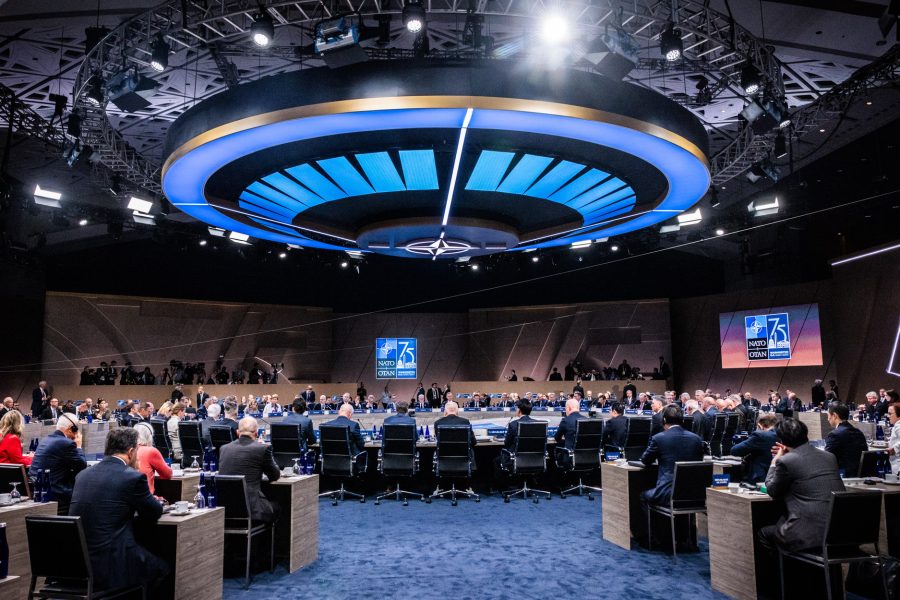NATO leaders gathered in Washington D.C. for the alliance’s 75th anniversary summit said they were alarmed by China’s ambitions and aggression in nuclear, space, and cyberspace on top of its deepening ties with Russia, calling on the People’s Republic of China to act more responsibly.
“The PRC continues to rapidly expand and diversify its nuclear arsenal with more warheads and a larger number of sophisticated delivery systems,” the Washington Summit Declaration, released July 10, stated. “We urge the PRC to engage in strategic risk reduction discussions and promote stability through transparency.”
The declaration also said allies were concerned about “developments in the PRC’s space capabilities and activities.”
China’s advancements in nuclear weapons and space in recent years have sparked widespread apprehension, with U.S. analysts and military leaders frequently highlighting Beijing’s extremely rapid progress. China currently operates nearly 500 intelligence, surveillance, and reconnaissance satellites, forming a formidable “sensor-shooter kill web” that poses significant risks to U.S. forces, and the Pentagon estimates China could possess over 1,000 operational nuclear warheads by 2030, many of which will be deployed at heightened readiness levels, with plans for continued expansion.
NATO leaders said China’s cyber ambitions exacerbate the threat. The declaration condemns Beijing’s “malicious cyber and hybrid activities, including disinformation,” targeted at both the U.S. and Europe. The U.S. and its allies have reported increasing espionage and hacking attempts from China this year. Early this week, NATO allies raised red flags about a Chinese government-linked hacking group targeting business and government information.
“If we as a group of industry and nations don’t take steps to secure cyberspace now, we could find ourselves in a very bad place,” Robert Blair, senior director for national security and emerging technology at Mircosoft, said at NATO’s public forum on July 11. He added that NATO needs a common pact on cybersecurity, focusing on both attribution and cyber deterrence, labeling the increasing risk as an “immediate threat.”
Beijing’s growth in these sectors, coupled with its ties with Russia, remains a “profound concern” and a security challenge for NATO, officials said, as they work to build resilience, preparedness, and protection against China’s “coercive tactics and efforts to divide the Alliance.”
The official declaration saw strong condemnation of China, labeling Beijing as a “decisive enabler of Russia’s war against Ukraine” due to its “large-scale support” for Russia’s defense industrial base.
“We call on the PRC, as a permanent member of the United Nations Security Council with a particular responsibility to uphold the purposes and principles of the UN Charter, to cease all material and political support to Russia’s war effort,” the declaration stated. “This includes the transfer of dual-use materials, such as weapons components, equipment, and raw materials that serve as inputs for Russia’s defense sector.”
“China is propping up Russia’s war economy,” NATO Secretary General Jens Stoltenberg added July 11. “This is not just a temporary coalition of convenience, it is a major strategic shift.”
Finnish President Alexander Stubb said the declaration’s language on China is purposefully “harsh” because while China may not be providing Russia directly with weapons like North Korea or Iran, it is offering “industrial assistance and maintaining trade” with Moscow.
Concerns over China’s military ties with Russia have prompted NATO to increase its focus on Indo-Pacific partnerships. Member nations have expanded dialogue, increased economic cooperation, and staged joint military exercises with countries including Australia, New Zealand, South Korea, and Japan, who all attended the summit.
“China is an increasing concern for us, helping Russia with military equipment and doing a lot of things that the sanctions against Russia is aiming to stop,” said Ulf Kristersson, the prime minister of Sweden, which joined the alliance this year. “It also emphasizes the need to cooperate with the Indo-Pacific region. … Security nowadays is now a very global thing, not a regional thing.”
China is lashing out against the 32-member states’ collective statement. China’s foreign ministry said the Washington Summit Declaration is a “scaremongering piece about the Asia-Pacific,” denying responsibility for the war in Ukraine.
“Its paragraphs on China contain a load of biases, smears, and provocations,” Chinese foreign ministry spokesperson Lin Jian told reporters on July 11. “NATO has been spreading disinformation created by the U.S. and blatantly smearing China to undermine China’s relations with Europe and hamper China-Europe cooperation.”
But NATO officials said China’s activities have also drawn Asian countries closer to the alliance.
“What happens in Ukraine today can happen in Asia tomorrow,” Stoltenberg said in remarks with Japanese Prime Minister Fumio Kishida July 11.
